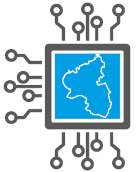>> AI ALLIANCE RP > AI RESEARCH > BIOMATHEMATIK
Biomathematik, Fachbereich Mathematik und Technik
-
We use methods of machine learning, statistics and also mathematical models to answer biological and medical questions. Depending on the problem, this can be
- Development of new machine learning or new statistical methods related to the life sciences
- Data analysis and mathematical modelling
- Data driven control of biomedical systems (e.g. optimal treatment strategies)
- Causal Modelling
Currently, we focus on two application areas
- molecular cancer research (Computational biology)
- Clinical decision support with AI methods (Biomedical data science)
An important aspect of our work is the close cooperation with the life sciences, because without the deep domain knowledge we cannot make any scientific progress. We have a many years of experience with high dimensional and multimodal data. Wir haben auch Erfahrungen in der Verknüfung von Kontrolltheorie und Machine Learning
Address
Koblenz University of Applied Sciences
Fachbereich Mathematik und Technik
Biomathematik
Joseph-Rovan-Allee 2
53424 Remagen
++ 49 (0) 2642932330
kschischo@hs-koblenz.de
https://www.hs-koblenz.de/en/mut/forschung-projekte/labore-projekte/computational-biology/computational-biology
Leading Researchers
Special Expertise
Basic Research
- Machine Learning (ML): Self-Supervised Learning, (Semi) Supervised Learning, Artificial Neural Network (ANN), Decision Tree, Bayesian Neural Networks, Model Based, Generative Models, Dimensionality Reduction, Feature Engineering/Feature Extraction
- Knowledge-Based Systems: Causality
- Robotics: Control Algorithms, Simulation Technology
Application related Research
AI Events
18.07.2023 - 20.07.2023: SafeAI and Data Governance in Clinical Decision Making
AI Research Projects
FOR2800: Modelling the link between replication stress, chromosomal instability and aneuploidy
Duration: 03.01.2023 - 08.02.2026, Funding Organization: Deutsche Forschungsgemeinschaft (DFG)
Data2Health: Data2Health: Trustworhy data analytics for health care,
Duration: 09.01.2022 - 10.03.2023, Funding Organization: Ministerium für Wissenschaft und Gesundheit Rheinland Pfalz- Sepski: Data-driven AI systems for individualized early detection and treatment optimization of sepsis in hospitals
Duration: 01.01.2022 - 01.03.2023, Funding Organization: Ministerium für Wissenschaft und Gesundheit, RlP - GTT: A global trigger tool for sentinel events in hospitals linked to COVID-19 infections
Duration: 03.01.2021 - 10.03.2022, Funding Organization: Ministerium für Wissenschaft und Gesundheit, RlP - SEEDS: Structural errors estimation in dynamic systems
Duration: 03.01.2017 - 01.03.2024, Funding Organization: Deutsche Forschungsgemeinschaft (DFG)
